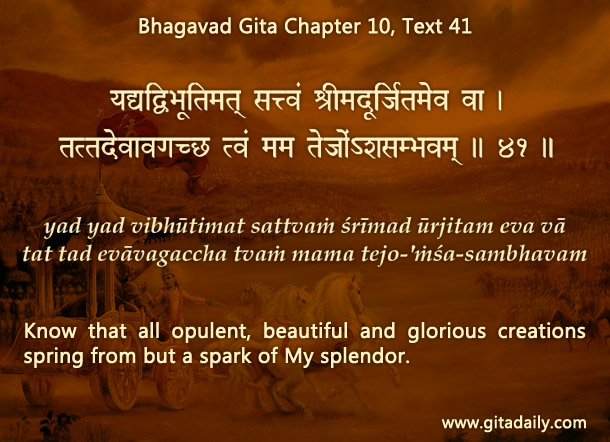At the start of the Bhagavad-gita, Duryodhana assesses the strengths of the two armies assembled on the Kurukshetra batl (01.02-01.10). Therein, he mentions the principal warriors on both sides, but forgets to mention Krishna. His neglecting Krishna is understandable because Krishna had declared he would be a non-combatant. So, Duryodhana thought that Krishna’s presence wouldn’t matter and he focused on comparing the material arrangements of the two opposing forces.
But while overlooking Krishna, Duryodhana forgot what Krishna’s presence on the opposite side signified: it signified that the Pandavas were in harmony with the spiritual principle of devotion. While we ourselves can do some good, we can do far more good if we become willing instruments for the Supreme — his plan is far better than ours. In fact, the Gita assures Arjuna of victory if he fights as an instrument for Krishna (11.33).
In fact, Krishna desists from fighting personally so that he can give his devotees like Arjuna the opportunity to act on his behalf and get the resulting glory. This empowering devotional dynamism is completely missed by the materialistic assessment of self-obsessed characters like Duryodhana, who bank on material superiority for victory. Duryodhana was oblivious to the power of inner alignment through the spiritual principle of devotion; worse still, he was also massively misaligned with that principle — he had brazenly defied Krishna time and again. This delusion of Duryodhana spelt his doom, which is indirectly conveyed in the Gita’s concluding prophecy (18.78).
When we face life’s challenges, we may succumb to the Duyodhana delusion by assessing things only materially. Instead, if we strive to stay spiritually aligned by practicing bhakti-yoga, we will get the grace to overcome those challenges (18.58).
One-sentence summary:
When facing life’s challenges, see not just the outer arrangement of material powers, but also the inner alignment with spiritual principles.
Think it over:
- While assessing the assembled armies, what did Duryodhana forget? Why?
- What principle were the Pandavas aligned with? How did it empower them?
- While tackling any challenge you are facing, how can you avoid the Durodhana delusion?
***
01.10: Our strength is immeasurable, and we are perfectly protected by Grandfather Bhishma, whereas the strength of the Pandavas, carefully protected by Bhima, is limited.
To know more about this verse, please click on the image
Explanation of article:

Podcast:


Leave A Comment